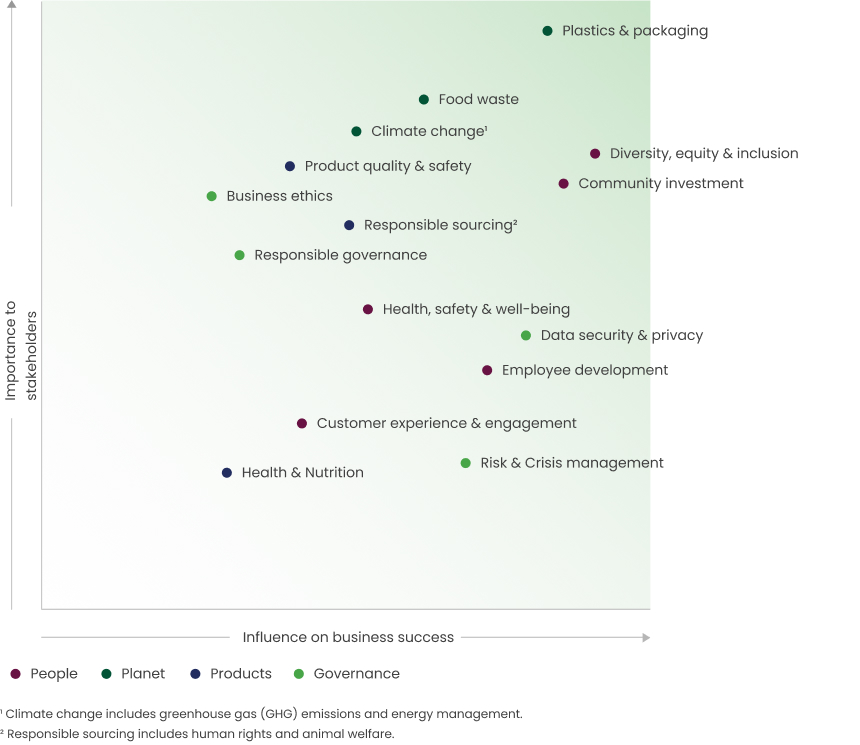Sustainability Approach
We are focused on the environmental, social and governance (ESG) factors that matter most to our stakeholders—ensuring we have the right approach on materiality, strategy and governance to keep making strides in our sustainability journey. Along the way, we’re committed to being upfront about our goals, progress, success stories and areas where we have more work to do.
We listen to our stakeholders and scan our world and industry for ESG risks and opportunities
We determine material ESG factors including key areas in which we can make a big impact (e.g. our Big Three and new Climate Action Plan)
We shape and implement our sustainability strategy and governance to manage ESG factors and advance our business strategy
We share our progress through our Sustainable Business Report and other ESG disclosures
Engaging Our Stakeholders
Effective and meaningful engagement with our diverse stakeholder community is a vital part of how we do business and identify ESG-related risks and opportunities. We define stakeholders as groups and individuals who are impacted by our operations and corporate strategy and who, in turn, impact our business success. Listening to, sharing with and learning from them is essential to our progress.
Key Stakeholder |
How We Engage |
|---|---|
Key StakeholderTeammates (across corporate and franchise sites, in operations and office-based) |
How We Engage
|
Key StakeholderInvestor Community |
How We Engage
|
Key StakeholderCustomers |
How We Engage
|
Key StakeholderSupplier Partners |
How We Engage
|
Key StakeholderCommunities |
How We Engage
|
Key StakeholderNGOs |
How We Engage
|
Key StakeholderGovernment |
How We Engage
|

Materiality Assessment
In fiscal 2021 we conducted a materiality assessment to identify and prioritize the environmental, social and governance (ESG) issues that are most important to our stakeholders and will influence our business success in the long term. We also reviewed grocery and retail industry leading practices and sustainability reporting frameworks, such as the Global Reporting Initiative (GRI) and Sustainability Accounting Standards Board (SASB) Food Retailers & Distributors Standard.
Based on input from our stakeholders and strategic planning, we articulated a sustainability framework based on our People, Planet and Products pillars—all enabled by our commitment to strong corporate governance and fully aligned with our business strategy, Project Horizon. We built dedicated and robust teams to focus on the 18 material ESG topics that sit under our pillars.
Learning from ongoing discussions with our stakeholders in fiscal 2022, we have expanded on two ESG topics that are of interest to our stakeholders, specifically energy management and environmental management. This materiality assessment provides the foundation of our sustainability strategy and continues to underpin our work. For definitions of each of these topics, click here. We will reassess our materiality approach in fiscal 2023 as part of our work to develop a new Sustainable Business Strategy.
The Big Three
The work on our materiality assessment has given us insights into three of the big issues that are top of mind for our stakeholders, that matter deeply to us and that are critical to creating a sustainable, inclusive future for everyone:
Context |
Continuing Opportunities & Best Practices |
Why It Matters to Us |
|
|---|---|---|---|

Diversity, Equity & Inclusion (DE&I)Learn more about our approach |
Context
|
Continuing Opportunities & Best Practices
|
Why It Matters to Us
|

Plastics & PackagingLearn more about our approach |
Context
|
Continuing Opportunities & Best Practices
|
Why It Matters to Us
|

Community InvestmentLearn more about our approach |
Context
|
Continuing Opportunities & Best Practices
|
Why It Matters to Us
|
Evolving Progress on Climate Action, Our Sustainability Strategy and Disclosures
In fiscal 2022 we continued to make progress on our sustainability journey:
Climate Action Plan
We are taking bold action to tackle climate change, committing to science-based targets (SBTs) to achieve net-zero by 2040 for our Scope 1 and Scope 2 emissions, and net-zero by 2050 for our Scope 3 emissions.
To achieve our long-term targets, we have set near-term targets to drive our progress (compared to a 2019 base year):
- We will reduce absolute Scope 1 and 2 emissions by a minimum of 55% by 2030
- To reduce Scope 3 emissions, we are targeting:
- 62% of our suppliers by spend setting a science-based target for their Scope 1 and 2 emissions within five years (by 2027)
- Reducing emissions from fuel sold by 28% by 2030
SBTs are internationally recognized and validated greenhouse gas (GHG) reduction targets that align with the Paris Agreement. We are pursuing validation of our targets through the Science Based Targets initiative (SBTi). In alignment with SBTi requirements, our targets address emissions from our operations, fleet and distribution (Scope 1 & 2), as well our extended value chain (Scope 3). Learn more about our bold new Climate Action Plan.
Building Our Next Sustainable Business Strategy
Over the next year we will finalize our next Sustainable Business Strategy to begin implementation in fiscal 2024. Our new strategy builds on the strong foundation we have established over recent years, with an increased focus on integration with business purpose and strategy, and a growing number of measurable targets and action plans in key impact areas.
Enhanced Disclosures
We continue to enhance our disclosures in alignment with standards such as the Sustainable Accounting Standards Board (SASB) Food Retailers & Distributors Standard. We’ve been listening to key stakeholders, such as our investors and analysts, and in this year’s report we’ve strengthened how we share information about governance, programs, policies and our progress. We are preparing to integrate disclosures aligned with the Task Force on Climate-Related Financial Disclosures (TCFD) and looking ahead to anticipate mandatory ESG disclosures in Canada.
Our view of the challenges and opportunities is closely aligned with these reports and organizations:
- What Job Seekers Really Think About Your Diversity and Inclusion Stats , Glassdoor, 2021
- Government of Canada invests more than $1.3 million to support Black women and girls , Government of Canada, 2022
- Diversity Among Board Directors and Officers: Exploratory Estimates on Family, Work and Income ; Statistics Canada, 2021
- Report: 2021 Diversity Disclosure Practices – Diversity and leadership at Canadian public companies , Osler, 2021
- How to Hold Business Leaders Accountable for DI Outcomes , Gartner, 2019
- Closing the Plastics Circularity Gap , Google, 2021
- Canada-Wide Action Plan on Zero Plastic Waste Phase 1 , Canadian Council of Ministers of the Environment, 2019
- Canada-Wide Action Plan on Zero Plastic Waste Phase 2 , Canadian Council of Ministers of the Environment, 2020
- Upstream Innovation, A Guide to Packaging Solutions , Ellen Macarthur Foundation, 2020
- Youth Mental Health Canada , 2019
- HungerCount 2021 , Food Banks Canada, 2021
- Weather-related disasters increase over past 50 years, causing more damage but fewer deaths , World Meteorological Organization, 2021




